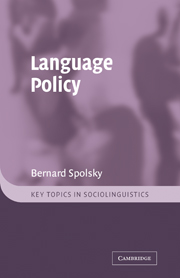Book contents
- Frontmatter
- Contents
- List of tables
- Preface
- 1 Language practices, ideology and beliefs, and management and planning
- 2 Driving out the bad
- 3 Pursuing the good and dealing with the new
- 4 The nature of language policy and its domains
- 5 Two monolingual polities – Iceland and France
- 6 How English spread
- 7 Does the US have a language policy or just civil rights?
- 8 Language rights
- 9 Monolingual polities under pressure
- 10 Monolingual polities with recognized linguistic minorities
- 11 Partitioning language space – two, three, many
- 12 Resisting language shift
- 13 Conclusions
- References
- Index
11 - Partitioning language space – two, three, many
Published online by Cambridge University Press: 22 December 2009
- Frontmatter
- Contents
- List of tables
- Preface
- 1 Language practices, ideology and beliefs, and management and planning
- 2 Driving out the bad
- 3 Pursuing the good and dealing with the new
- 4 The nature of language policy and its domains
- 5 Two monolingual polities – Iceland and France
- 6 How English spread
- 7 Does the US have a language policy or just civil rights?
- 8 Language rights
- 9 Monolingual polities under pressure
- 10 Monolingual polities with recognized linguistic minorities
- 11 Partitioning language space – two, three, many
- 12 Resisting language shift
- 13 Conclusions
- References
- Index
Summary
PARTITIONING LINGUISTIC SPACE – DYADIC AND TRIADIC POLITIES
The monolingual nation state exists ideologically if rarely in observable language practice. In multilingual nations, the significance of two or three or more major languages is recognized. However, there is no reason to suspect that it will be this linguistic fact rather than people's perception of it that will be the driving force of language policy. In this chapter, we deal with nation states that have recognized not just the existence but also the claims of more than one language and have attempted to satisfy these claims by partitioning their linguistic space and assigning a portion to each.
How might this be done? An initial problem is the sloppiness of the labels we have available. The word bilingual is used for both an individual and a society, and commonly assumed to carry the meaning of equality of proficiency or use. A bilingual individual in this sense is rare: plurilingual proficiency, as the Council of Europe experts more sagely named it, covers wide ranges of difference in the kinds and domains of language competence in two (or usually more) varieties of language. An Israeli may do physics in English, but prefer to talk about football in Hebrew. Most people probably continue to count in the language they first spoke and are more comfortable speaking of certain topics in one of their various languages. Plurilingual proficiency is better described or profiled than measured.
Information
- Type
- Chapter
- Information
- Language Policy , pp. 161 - 185Publisher: Cambridge University PressPrint publication year: 2003
